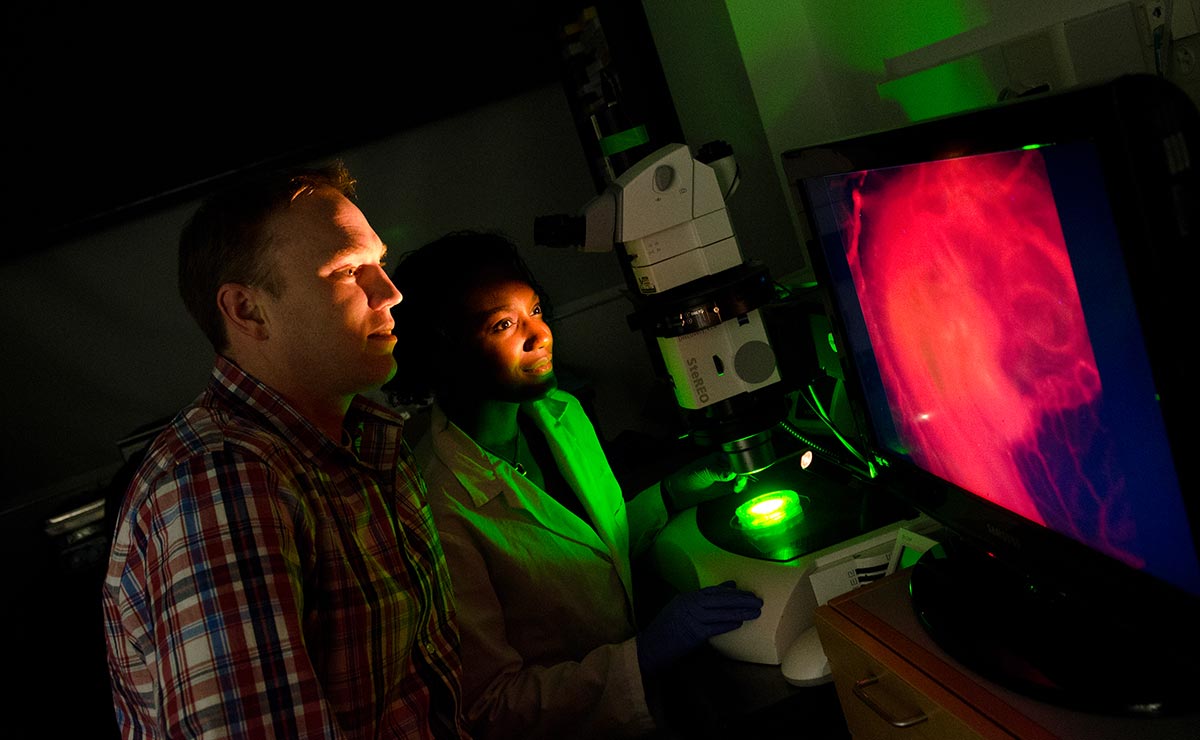Long-awaited biomedical engineering major gets green light
By Joe Wilensky


Cornell University has received state approval to offer a long-awaited undergraduate major in biomedical engineering (BME) and will begin taking sophomores into the program this fall.
“This has been part of the conversation since Cornell Engineering’s BME department started,” said Lawrence Bonassar, professor of biomedical engineering and an original member of the department, which was created a decade ago and currently offers master’s of engineering and Ph.D. degrees and an undergraduate minor.
The College of Engineering also just announced a $50 million gift to expand the BME department into a school named the Nancy E. and Peter C. Meinig School of Biomedical Engineering.
“The Meinigs’ gift will give the new school significant resources as we launch the new major,” said Marjolein van der Meulen, the Swanson Professor and the James M. and Marsha McCormick Chair of Biomedical Engineering. “Launching our biomedical engineering undergraduate major is an initiative our faculty have been working on for a long time, and an opportunity our students have been eagerly anticipating,” van der Meulen said.
“College administrators and faculty have known that many engineering students would have majored in BME if they could have the option available,” Bonassar said. A survey of the incoming Engineering freshman class indicated that 60 percent of the students had an interest in biological applications of engineering.
“This major allows Cornell Engineering to attract creative and intelligent prospective students who are interested in biomedical engineering,” explained Jonathan Butcher, associate professor of biomedical engineering, associate department chair and director of undergraduate studies for the department. For the Class of 2019, 12 percent of incoming freshman engineers have indicated BME would be their top choice.
“Our college’s particular strengths in BME fit well into Cornell’s collaborative culture and accentuate our collaborations with the College of Veterinary Medicine and Weill Cornell Medical College,” she said.
Biomedical engineering builds research around a quantitative understanding of the human body as an integrated, multiscale system. The study of mechanisms of disease through engineering analysis can be used to design better therapies, devices and diagnostic procedures to improve human health.
Unlike graduates of many traditional engineering fields, BME graduates must be able to thrive in an environment of variability and think through problems in which the assumptions are poorly defined, Butcher said. For example, a piece of steel has very consistent values for its strength, elasticity and other properties, while in biology, 10 samples of the same type of ligament can be tested and generate 10 different results. “How do you make a product that works robustly and accommodates biological variability?” he asked.
The BME major at Cornell will include a core curriculum with options for four concentrations: biomaterials and drug delivery; instrumentation and imaging; biomechanics; and molecular, cellular and tissue engineering. Application- and concept-driven courses will be integrated from the beginning and will maintain a strong presence throughout the four-year program.
“Engineering education research shows that students are more motivated and perform better when they can see the applications of what they’re doing up front,” Bonassar said. “For BME students, applications to human health will always be there, to connect them to real-world problems … increasing both interest and retention in the long term.”
Other notable parts of the undergraduate major will include senior capstone labs to complement capstone design courses.
Bonassar said the new major also has the potential to significantly shift the college’s demographics: the College of Engineering incoming freshman class is 48 percent female – a historic peak for the college, he said – and of the recent survey of students who listed the BME major as their top choice, nearly 70 percent were women.
“We have worked for over 10 years to build a department with the diversity of expertise and number of faculty to successfully launch an undergraduate program,” said Mike Shuler, the Samuel B. Eckert Professor of Engineering who was the founding James and Marsha McCormick Chair of BME for 10 years. “I am pleased that we have reached that milestone and expect Cornell to become a leader in undergraduate BME education.”
Media Contact
Get Cornell news delivered right to your inbox.
Subscribe